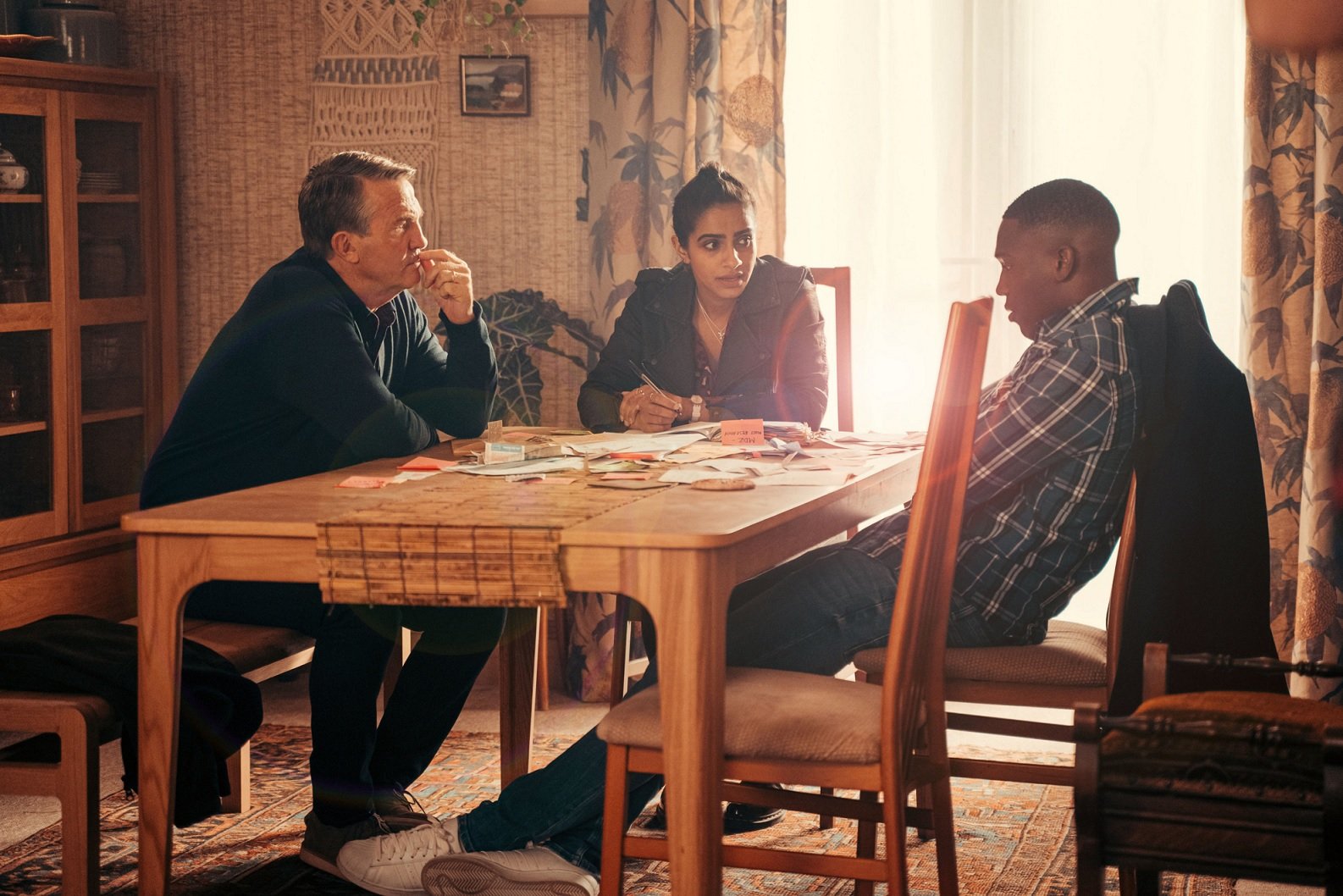I’ve recently been energized, as I’m sure you have, by the action stills for the upcoming not-Christmas special, Revolution of the Daleks. First, we have the Doctor marking time (interesting). Then, we got that tension-filled shot of Yaz, Graham, and Ryan staring at the table the latter assembled, wondering… will it hold? Some heavy stuff, that.
But it got me thinking about how the Doctor treats companions in general.
The vast majority of the past 57 years, we’ve known all along that the Doctor’s watchword is compassion. Compassion for all life, different alien species, worlds – you name it. That compassion is at its most prevalent with the Doctor’s companions. Usually.
In the early days, the First Doctor, of course, showed love and compassion toward his granddaughter, but initially, he had to warm up to these humans, Ian Chesterton and Barbara Wright. It did however, do the Doctor a world of good. He became very attached to them and came to care for them a great deal, and it showed. This really became a thing — the Doctor caring for his companions.
Sure, there was the time the Doctor, Ian and Barbara simply left Vicki stranded on a planet with Daleks (The Chase), but to be fair, it was quite a hectic back and forth, in and out of the TARDIS in many locations type of scenario. I’m not entirely surprised they lost a straggler. Understandable to an extent – the old “Isn’t she with you?”/ “No, I thought she was with YOU!” Actually, with the Daleks chasing them over hill, dale, and nebula, I don’t think they quite noticed Vicki was missing at first. To be fair, she really wasn’t a screamer/crier/ankle twister like Susan and how soon do you really miss the quiet, dignified ones? And Vicki hung tough and caught up with the gang, bless her heart.
But still, it was very very clear that the Doctor cared for his companions. Now, some of the producers clearly didn’t care about or want some of the companions and that’s a different matter entirely. The First Doctor was always quick to fuss over the well being of Vicki, Katarina, Steven, Dodo, Ben, and Polly, but John Wiles and Innes Lloyd treated the characters horribly and dumped them whenever and however they could. Often in undignified (Dodo), unlikely (Steven), or horrific (Katarina) means. The point is, at least the Doctor cared about them.
The Second Doctor was always fretting about Jamie and Victoria and Zoe. The Third Doctor enjoyed working with Liz, almost got too attached to Jo (more like a daughter, but I can see how some might have thought it was something more). These incarnations clearly cared for these humans as much as possible.

Things went to a different level with the Fourth Doctor and Sarah, mostly because the Doctor was no longer the grandfather or kindly uncle – but younger, and let’s face it, Elisabeth Sladen. But we’ve seen a few Doctors pine over Sarah Jane. Bottom line, HE CARED.
Veering into the 1980s and the divisive works of John Nathan-Turner, this began an era where the Doctor didn’t invite a lot of these new companions onto the TARDIS; they were often shoved onto the Time Lord by circumstance (Tegan) or devious means (Turlough), and some were poorly cast (that’s on JN-T), but still, even under these less that perfect circumstances, there were still scenes where it was very obvious that the Fifth Doctor cared for Adric, Nyssa, Tegan, and again, beyond producer interference, passionate arguments notwithstanding and the occasional strangulation, that the Sixth Doctor even cared for Peri.
Now, during the Seventh Doctor’s era, try as he might to make the Doctor a manipulative, secretive creep towards Ace, Andrew Cartmel made it very clear that the Doctor and Ace were Professor and student, but very close pals. During these turbulent years, companions like Adric and Mel even got love.
The new era brought very, very tight bonds between the Doctor and Rose, and Martha, even forming tight friendships with respect to Mickey and Jack. Amy was the Eleventh’s anchor, while Clara was so important to the Twelfth… well, we saw the lengths he’d go to for her.
I think at this point, it’s important to remember or point out that, historically, up until this point, any producer who has brought in their own, hand picked companions, have shown said companions respect and treated them properly. Or more to the point, had that particular incarnation of the Doctor show they care for them.
Then there’s the curious case of the Chibnall years.
He introduces us to rookie police officer Yaz, developmentally challenged Ryan, and cancer survivor Graham. Three companions who, in the premiere episode, seem to have a lot going for them, a lot of potential – none of it ever realised. Through a mishap at the end of the episode, they’re dragged along with the Doctor to space. She did not invite them. But even after they survive their next adventure, a couple of odd things happen.
The companions don’t seem excited to be hanging around the TARDIS, but they pretty quickly figure it’s just sort of their lot in life, and they’re under the impression that they’re all in this for the long haul, with this crazy Doctor. They really don’t seem motivated to do anything really, resigned to just stick with the Doctor, because reasons. It all comes off as them having nothing better to do.
The Doctor doesn’t really give much proof of actually caring or being close to these people, yet she constantly collects them behind her like baby ducks in formation, and steadfastly refers to them as her “fam”. Plus she doesn’t show some affection at the start of Arachnids in the UK, egged on by Yaz’s reluctance to let her go so quickly.

In Series 12, there are a few instances where the Doctor’s clearly got more important things on her mind, and would love to bring in a nanny or dog walker to take on this responsibility she clearly doesn’t want. In Fugitive of the Judoon, one of the few high points of the series, her whole “family” of ducks completely disappear and she doesn’t even remember they exist until they show up at the episode’s end. For that episode, Chibnall had to offload them on a play date with Captain Jack, just so they didn’t muddy up the important storyline that still hasn’t been properly explained.
I know what you’re thinking. The Doctor should have at least had Ryan with her at the lighthouse, because as we all know, with Ryan there, IT’S SORTED.
Even in the small, quiet moments, meant for character growth, things aren’t right. Moments after easily defeating some evil gods, she gives a long, proud speech about love and compassion for all things. It was a pretty good speech. Yet in the next scene, when a “close” member of her fam, Graham, opens his heart to the Doctor about his fears of his cancer coming back, suddenly, the long speech about compassion is long gone – the Doctor suddenly is at a loss for words or compassion, and “maybe just too alien” as some defenders would have you believe.
Why Graham, Yaz, and Ryan even stick around is a huge question mark. They’ve been portrayed as incompetent and useless a number of times, with their characters mostly left unexplored. You get the impression that they’re just bored most of the time — which might be hard to believe, but Chibnall manages to pull it off.
Chibnall wanted to bring in a diverse cast, as far as ethinicity, sex, age and abilities. That’s excellent.
But to do that, then to cast them poorly, and not develop these characters, to then write them poorly and worst of all, have the Doctor treat them with false affection, apathy, or utter disdain… why do it?
Who is benefiting from this scenario? Certainly not the Doctor, the “fam”, the fans, or the general audience. I’d say maybe any show transmitted opposite it might benefit, but that’s it.
And yes, that table will fall apart. Ryan didn’t sort it.



